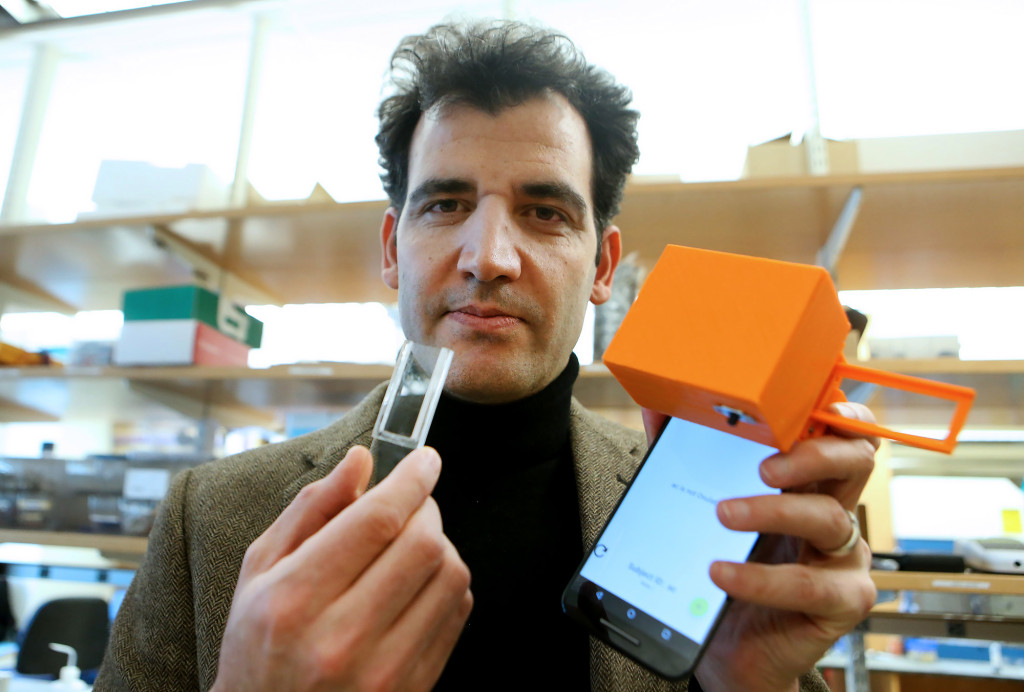At Harvard Medical School, Dr. Hadi Shafiee unites developments in fertility medicine with new technology. His work aims to make previously complicated tests – such as ovulation tests and male fertility tests – a simple, affordable process that can be done at home.
Based at Brigham & Women’s Hospital, Shafiee and the students in his lab have developed a number of ways to combine easily accessible smartphone technology with the complexities of medical tests.
In addition to hundreds of scientific publications, these developments have earned Shafiee prestigious awards, including the 2014 BWH Bright Futures Prize, and the 2015 Innovation Evergreen Award from Harvard Medical School.
Hadi Shafiee’s New Fertility Test
Shafiee’s latest invention is a smartphone ovulation test that requires just a saliva sample. This could radically reduce the hassle and headache of family planning. The test works through a simple attachment to a smartphone.
“We developed a 3D printed smartphone-attachment similar to a cellphone case that literally turns the phone to a small microscope,” Shafiee explains. The microscope automatically examines a saliva sample and reports the results back in less than 10 minutes. While saliva-based ovulation testing is not itself new, Shafiee’s smartphone attachment makes the process far more affordable and accurate.
“There are products that are currently available in the market [that test saliva],” Shafiee says. “However, these products require women to manually view the ferning structures [the results] under a lens…One study even found that over 50% of such tests were uninterpretable by the users.”
Shafiee’s solution automatically interprets these results, saving women the cost of further tools and the headache of misreading complex data.
Becoming a Bioengineer
As a student at the Isfahan University of Technology and the University of Tehran, Shafiee focused on mechanical engineering. But when he received a full scholarship to Virginia Tech’s Department of Engineering Sciences and Mechanics for his PhD, the scientist quickly found his niche.
“I wanted to do something different and impactful during my PhD in the US,” Shafiee says. “I found bioengineering and particularly micro- and nanotechnologies, and their application in biology and medicine, fascinating. So I did not have any experience in bioengineering. But I was ready to accept the challenge and learn something fundamentally new outside of my home country.”
Shafiee has certainly thrived in his chosen area of interest. Now the head researcher of his own laboratory at Brigham Women’s Hospital, Shafiee has been responsible for the development of a wide range of smartphone-based technologies, from male fertility tests to at-home HIV tests.
Hadi Shafiee: The Future of Fertility Testing
When Shafiee first introduced his male fertility testing project, he stumbled upon a rich field for new research and development: affordable, smartphone-based, home testing. With this development, new opportunities opened up for Shafiee.
“When we published last year on a technology for analyzing sperm to detect male infertility, we were approached by those who had read about our work and were wondering if we could develop a smart-phone based system to provide ovulation testing at home,” he explains.
In addition, Shafiee’s lab is currently working on a similar at-home test for HIV. These developments may radically change the market for family planning over the next several years.
“Our next step is to move towards FDA-approvals and commercialization,” Shafiee says. “We have already initiated discussions with several companies who are interested in the technology.”



